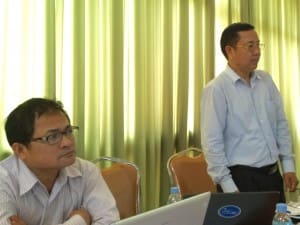Consensus-building in Cambodia – an MBBI Dialog Process Project

Left: Kakada Thorng, Executive Director, Cambodian Centre for Mediation (CCM) Right: Savath Meas, President, CCM
By Natasha Dyer
MBBI’s Dialogue Process Project (DPP) is one of the core projects of Mediators Beyond Borders International (MBBI). Its eight core members, three interns and multiple specialist associates work with mediators around the world to promote dialogue, alternative dispute resolution (ADR) and the use of community mediation to resolve different types of conflict. DPP is currently working on projects in Greece, the Czech Republic and Cambodia.
Rachel Wohl – Team Leader of MBBI’s Cambodia project – returned from Phnom Penh with three members of the DPP team, Katherine Triantafillou, Alan Gross and Laura McGrew, and reported on the project’s progress. MBBI is partnering with the Cambodian Centre for Mediation (CCM) to spread the practice of consensus-building dialogue in the country. The team has a combination of mutually beneficial skills, including international dispute resolution, knowledge of state politics, organizational development, conflict analysis in Cambodia and community mediation.
The team’s visit included conducting interviews, holding focus groups and hosting a training session on the consensus -building dialogue approach. The team is building the capacity of CCM to use a multi-stakeholder approach to resolving conflict, especially over land disputes, a serious problem across the country.
Since 2009, the Cambodian President has been granting concessions to foreign companies from China, Vietnam, Thailand and Malaysia to develop rural land. The farmers living and working on this land believe they own it but have no official deeds. Though some NGOs have been able to apply pressure through international banks, “companies” use military, police and private security companies to forcibly remove farmers.
Consensus building involves convening multi-stakeholder representatives of all groups with a stake in a particular dispute, such as business and community leaders, farmers, NGOs, and officials of the district, local and provincial levels. Using this approach, MBBI is partnering with CCM to expand their existing work training mediators to include consensus-building dialogues. Cambodians are very familiar with “Samrop Samruhle,” a traditional reconciliation process used by village leaders to resolve certain conflicts, but mediation is not well known. Part of MBBI’s role is to help CCM educate high-level stakeholders and others about the benefits of mediation and why it can help them resolve a broad range of their conflicts.
MBBI and CCM were encouraged by several of the in-country interviews. Some government officials and NGO leaders feel the time is ripe to expand the use of ADR in Cambodia. The leaders of CCM – President Savath Meas and Executive Director Kakada Thorn– are well known and highly respected for their work training district government officials and others in using conflict resolution and mediation skills. As a result of MBBI’s visit, CCM is exploring possible village-level consensus-building pilot projects to resolve land disputes. If such a pilot project proved successful, CCM believes it could obtain support to train people as mediators in every province and teach them how to use consensus-building dialogues to resolve land disputes.
Consensus-building takes time. It involves information gathering, a series of meetings to build understanding, and multiple steps to reach outcomes that will serve the common good. It is also a complex process to facilitate successfully and it is important to involve those opposed to finding solutions so that they do not sabotage efforts to achieve the outcomes that are developed. MBBI plans to continue its partnership with CCM to mentor their work on land disputes, support its work to spread the practice of ADR in Cambodia and to expand the mediation services it offers to under-served neighborhoods in Phnom Penh.
